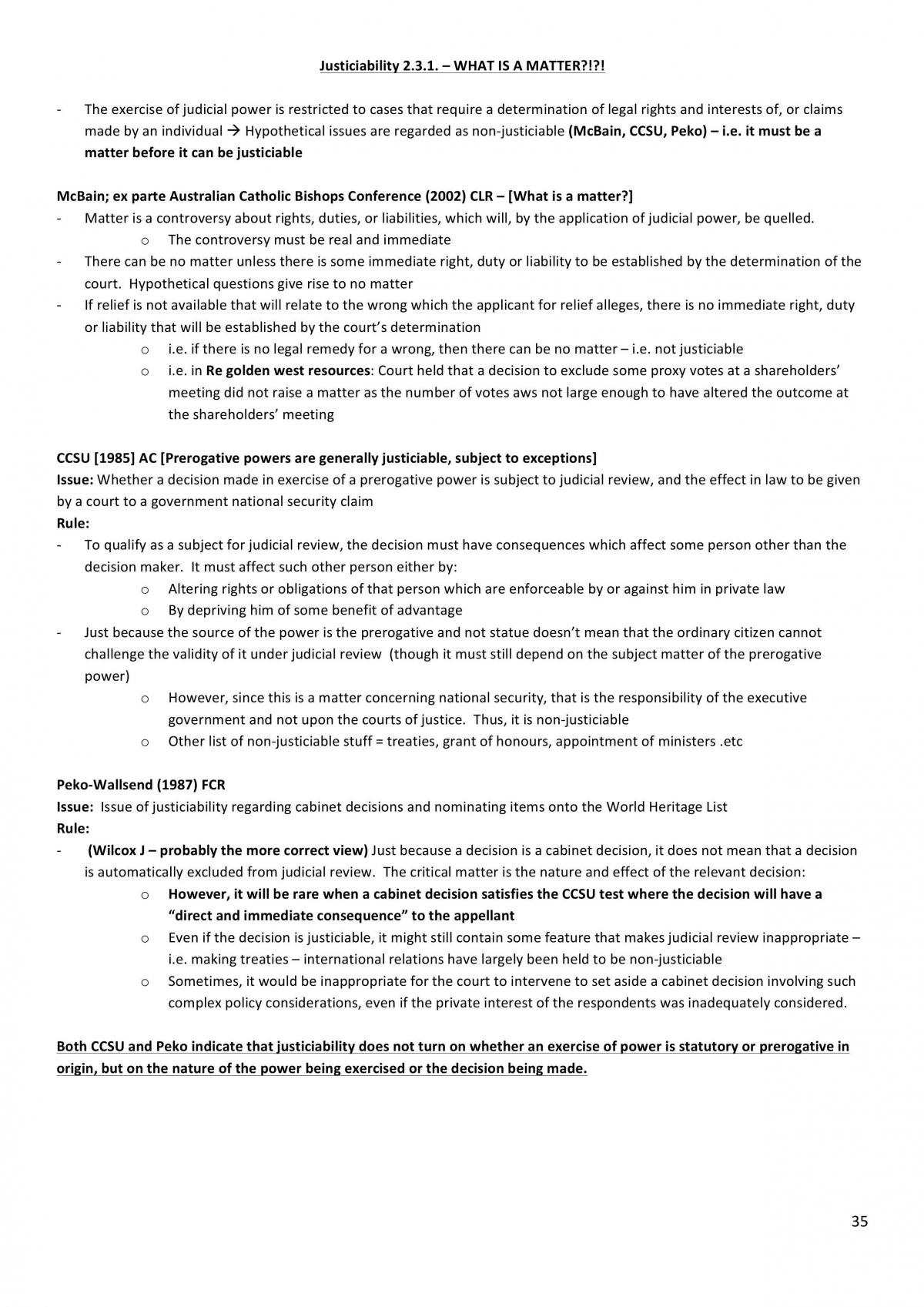Find
Search for over 200,000 study notes and past assignments!
Swap
Download study resources by swapping your own or buying Exchange Credits.
Study
Study from your library anywhere, anytime.
Admin Law Notes
LAWS1160 - Administrative Law
70 Pages • Complete Study Notes • Year: Pre-2021
The ombudsman investigates complaints from members of the public about government action and to conduct self-initiated into administrative problems The essence of the office is that the Ombudsman is non-partisan and judicial in his treatment and investigation of facts *relative importance of judicial power has been diminished by the growth of alternative mechanisms for legal dispute resolution Main advantage = informality, speed and effectiveness of complaint resolution - Many complaints that the Ombudsman looks at are about matters of administrative style and behaviour that would not be directly reviewable by a court or tribunal! Establishment of Ombudsman Offices in Australia - Established by the Ombudsman Act 1974 (NSW) / Ombudsman Act 1976 (Cth) - The ombudsman is “an office provided for by the constitution or by action of the legislature and headed by an independent high level public official who is responsible to the parliament. That official receives complaints from aggrieved persons against government agencies and officials. That official also acts on his own motion and investigates, recommend corrective action and issues reports”àFocuses on maladministration of government. The statutory framework for Ombudsman - Creation – office is created by statute - Appointment – (s21, 28, Cth) Ombudsman is appointed by the Governor-General for a term of up to 7 years and can only be removed by a resolution of both houses of parliament - Function – (s5, Cth) Core function is to investigate, either on receipt of a complaint or on the Ombudsman’s own motion, action that relates to a matter of administration - Jurisdiction – Public sector ombudsman – (s5, Cth) extends to the departments of public service, and to most executive and statutory authorities that has been constituted for a public purpose - Jurisdiction – Private sector ombudsman – (s3(4B), s3BA) extends to the actions of non-government bodies that provide goods and services to the public pursuant to a contract with government agencies o I.e. those that provide job network services for the unemployed, manage immigration detention cetnres, recruit personnel for government agencies .etc - Jurisdictional limitations – (s5) – main limitations is that the Ombudsman cannot investigate action taken by a minister, by a court or tribunal, or concerning the employment of a person in the public service - Discretion not to investigate – (s6, 6A) – Ombudsman can decline as a matter of discretion on several grounds: o Complainant became aware of the issue over 12 months ago o Complainant does not have a sufficient interest in the matter o There is an alternative method for administrative or judicial review o The complaint was not first raised with the agency to which it relates o Investigation is unnecessary or unjustifiable having regard to all the circumstances - Form of complain (s7) – may be in oral or writing. However, most state statutes require it in writing. There is no fee - Power and Procedure of ombudsman: o Investigations are usually conducted informally and by way of preliminary inquiries (s7A) o Guiding principle is that investigations are to be conducted in private (s8) o However, the Ombudsman has the same powers as a royal commission to require the attendance and examination of witnesses (s9), to administer oaths (s13), to require documents to be produced (s14) o Information is not released publicly unless the Ombudsman determines that it is in the public interest to do so (s35A)
This document is FREE
More about this document:
|
|
This document has been hand checkedEvery document on Thinkswap has been carefully hand checked to make sure it's correctly described and categorised. No more browsing through piles of irrelevant study resources. |
|
|
This is a Complete Set of Study NotesComplete Study Notes typically cover at least half a semester’s content or several topics in greater depth. They are typically greater than 20 pages in length and go into more detail when covering topics. |
|
|
What are Exchange Credits?Exchange Credits represent the worth of each document on Thinkswap. In exchange for uploading documents you will receive Exchange Credits. These credits can then be used to download other documents for free. |
|
|
Satisfaction GuaranteeWe want you to be satisfied with your learning, that’s why all documents on Thinkswap are covered by our Satisfaction Guarantee. If a document is not of an acceptable quality or the document was incorrectly described or categorised, we will provide a full refund of Exchange Credits so that you can get another document. For more information please read Thinkswap's Satisfaction Guarantee. |

Studying with Academic Integrity
Studying from past student work is an amazing way to learn and research, however you must always act with academic integrity.
This document is the prior work of another student. Thinkswap has partnered with Turnitin to ensure students cannot copy directly from our resources. Understand how to responsibly use this work by visiting ‘Using Thinkswap resources correctly’.
Browse UNSW Subjects




